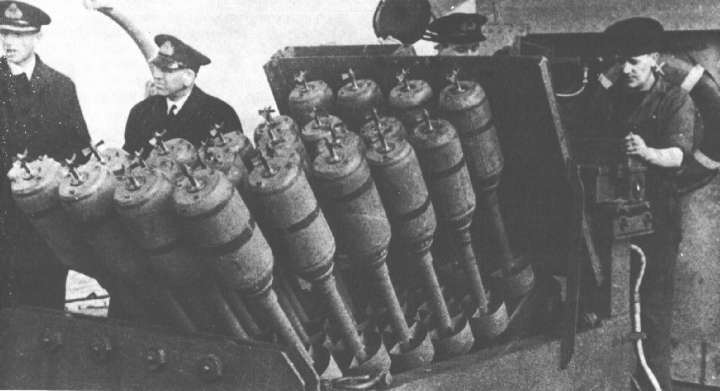

The second type was related to the method of attack used by single destroyers. They would acquire a target, once close enough, with ASDIC, then head toward the contact at speed. However, at a certain distance, the target would be too close to be spotted on ASDIC, which the submarine, again coupled with the problem of the slow-sinking depth charges, could use to avoid the attacker (as indeed German submarines did), since the attacker would need to speed up - to minimize the time between loss of contact and attack - which the submarine could hear if it had not yet picked up the destroyer (which was unlikely at best, though).
There were counter-measures
to this problem, for example teaming up, one ship holding contact while
the other deployed for a silent, slow attack. For single ships, this was
no solution, however, and a ahead-throwing weapon was needed. Hedgehog
could fill this gap.
Hedgehog was a 24-spigot mortar of crude build, usually firing to 300 yds
or around 250 meters ahead of the attacking ship, shortly after blind time
began. It fired a circle-formed salvo in the general area of the submarine,
each spigot containing 35lbs of Torpex. The spigots were contact fuzed,
thus only creating the disturbing noise of depth charge attacks when actually
hitting a submarine, which was as good as a kill though surfacing damage
was possible too. It is not known that any submarine survived a hedgehog
hit.
Hedgehog was fitted to destroyer escorts and British-build frigates only
during the war, though after the war many a Gearing, Sumner and
Fletcher conversion received this weapon.
The difference between Mks 10 and 11 was that Mk 10 fired an eliptical,
Mk 11 a circular pattern. Mk 11 became the postwar standard mount.
|
|
Usual range: 250
- 280 yards / 230 - 260 meters
Mount Weight: 28.780 lbs / 13.000 kg Sinking Speed: 25 f/s / 7.6 m/s Rate of fire: 1 per 3 minutes Charge: 65lbs / 30kg |